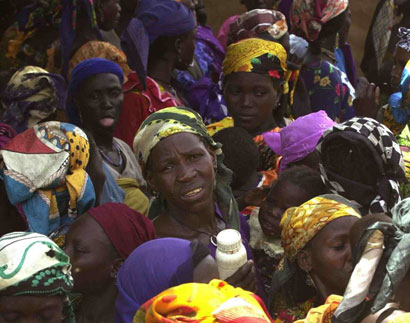Weather of mass destruction
 Drought, crop failure, submerged coastal cities, mass migration, armed conflict - those are the kind of horrors we can look forward to if the world fails to get its collective act together on climate change, and temperatures and sea levels continue to rise.
Drought, crop failure, submerged coastal cities, mass migration, armed conflict - those are the kind of horrors we can look forward to if the world fails to get its collective act together on climate change, and temperatures and sea levels continue to rise.
As the implications of "weather of mass destruction" - to quote Greenpeace - become better understood, climate change is being framed in a new way. These days, whether you talk to politicans, scientists, academics or environmental campaigners, it's all about security. But what does that actually mean?
Climate security enthusiasts agree that global warming is, well, a global issue. It cuts across national boundaries, and while most people on the planet will be affected by climate change in some way, it's likely to be the poorest who suffer the worst.
"Climate change is a security issue but it is not a matter of narrow national security - it has a new dimension," British Foreign Secretary Margaret Beckett argued last month in a speech to the U.N. Security Council, where climate change was debated for the first time. "This is about our collective security in a fragile and increasingly interdependent world."
The distinction between the narrow and broad interpretations of security is an important one for many environmentalists. A group of disasters experts argue in their report "Climate Change and Human Security" that climate change will affect both "interstate relations and international and national security in a narrow, geo-strategic sense" and "the well-being and survival of human beings and humankind and thus human, water, health and livelihood security".
The paper, available on disaster website Radix, also makes a stab at outlining how geo-political and human security might be affected over time: Short term (2007-2020) - Expect local conflicts over dwindling water
supplies, failure to meet the U.N.-set Millennium Development Goals on food and health, a growing inability of
states to cope with major disasters, and small numbers of people displaced by rising sea levels.
Medium term (2021-2050) - The forecast is for more local and some international conflict over water, significant numbers of people uprooted by famine, higher sea levels and mega-projects to help produce energy, and political unrest stemming from state failure to cope with disasters.
Long term (2051-2100) - The crystal ball sees major international conflict over water, mass displacement because of food shortages, epidemics and submerged land - sparking international tensions - and huge upheaval caused by weather catastrophes.
A quick scan around the globe suggests that some of the poorest countries in Africa and Asia are already feeling the heat.
Take Sudan. The Guardian recently suggested that the conflict in the western region of Darfur is "likely to be seen as the first climate change war". Julian Borger traces the roots of the conflict - which began in 2003 - to the mid 1980s, when a severe drought and famine pitted pastoralists against settled farmers.
And while the causes of Sri Lanka's civil war lie in the political and economic grievances of the island's Tamil ethnic minority, it may soon take on a climate-change dimension.
The U.N.'s Intergovernmental Panel on Climate Change (IPCC) points out that parts of northern and eastern areas claimed by Tamils as their homeland will be submerged when sea level rises, and that's likely to happen by 2025. "So people are fighting and dying over areas that may soon not be there," IPCC Vice-chairman Mohan Munasinghe told Inter Press Service.
The hope of those who believe governments have already left it rather late to act is that the new "climate security" discourse will push them to get their skates on. Painting climate change as a top global risk "makes political sense", wrote Jonathan Freedland in Britain's Guardian newspaper after the Security Council debated the issue. "Cast it as a problem for the big boys, on a par with nuclear proliferation or international terror, and then it should get a big-boy budget and attention," he argued.
Perhaps so. But we musn't forget the wider "human security" implications of climate change. Leaving the "big boys" to come up with solutions - guided by their own interests - risks shutting out large swathes of those likely to be worst affected: the world's poor. The onus may be on wealthier polluting nations to make up for their carbon profligacy by helping poor countries most vulnerable to the consequences. But that doesn't mean they should call all the shots.
The Radix paper suggests an alternative. "Ironically, climate change offers humanity an opportunity for a quantum leap in sustainable development and in peace making," it argues. Stronger international cooperation on tackling climate change - rather than competition - could also bring benefits for global stability, governance and development, the paper says.
It's still far from certain that the climate change cloud will turn out to have such a shiny silver lining.
But expect the debate to heat up again later this year with the release of the Human Development Report 2007, which will focus on the challenges of helping the world's poorest people cope with the social and economic impact of climate change.
Reuters AlertNet is not responsible for the content of external websites.
